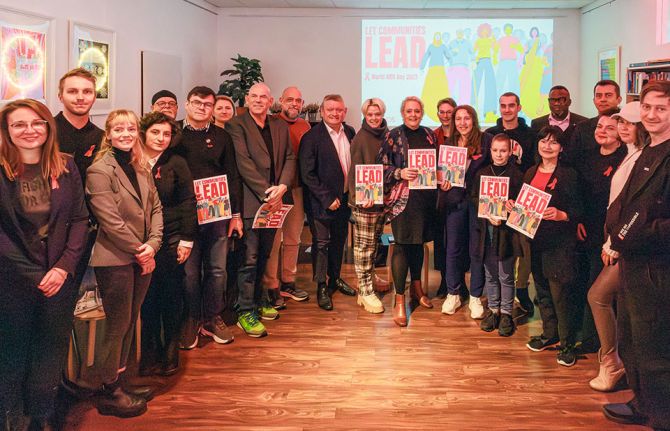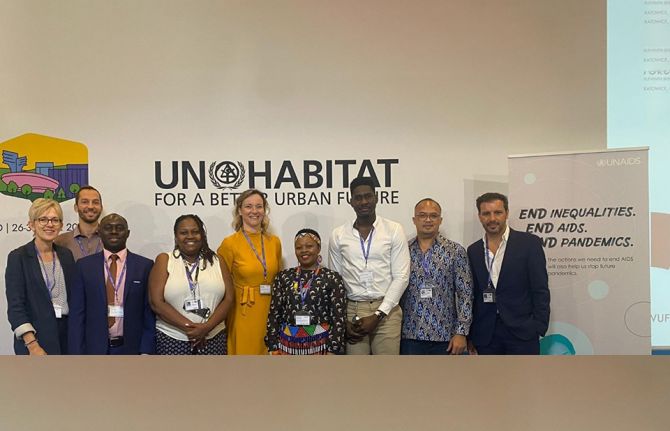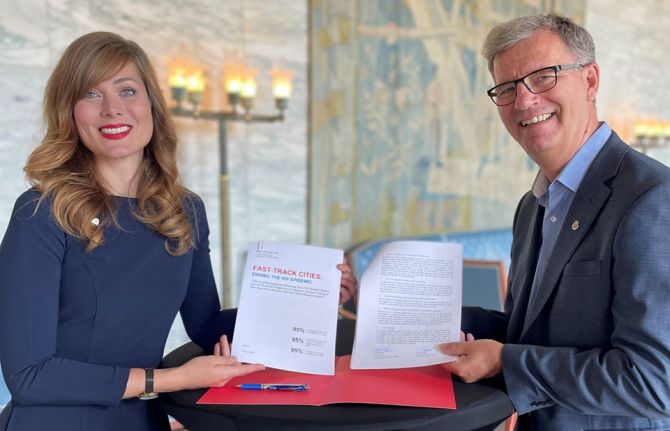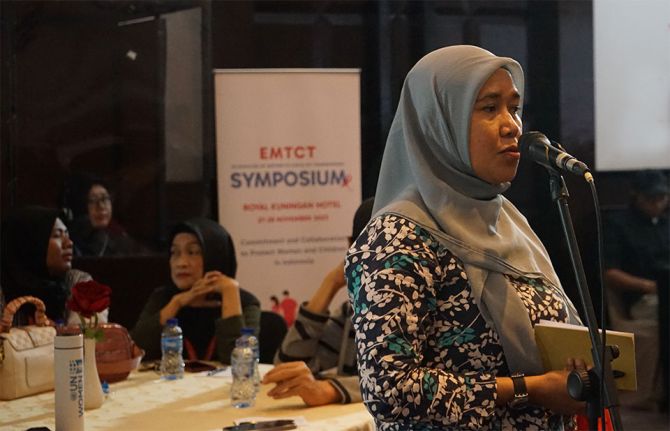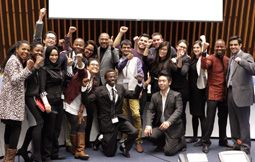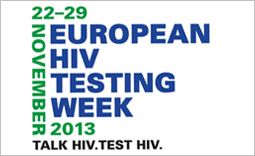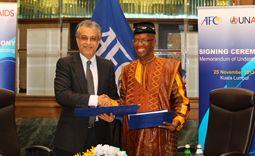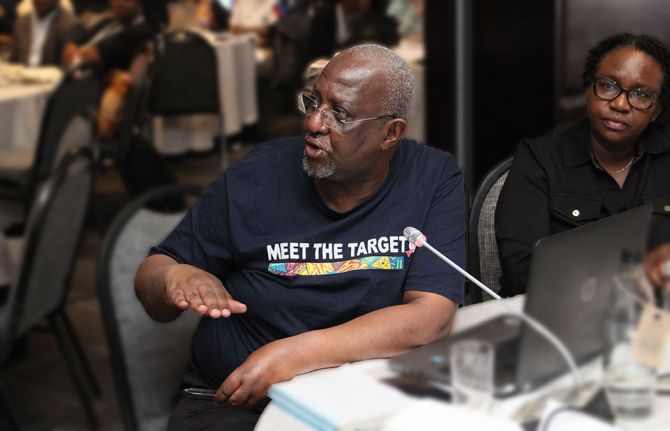
Feature Story
UN Economic and Social Commission in Asia and Pacific members adopt new Resolution on HIV ahead of High Level Meeting on AIDS
01 June 2011
01 June 2011 01 June 2011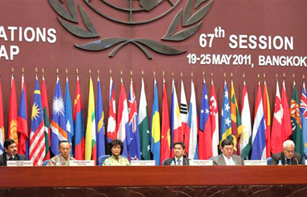
Resolution 67/9 on HIV was endorsed at the 67th UN ESCAP Commission held in Bangkok, Thailand from 19-25 May 2011. Credit: UN ESCAP
In the lead-up to the 2011 General Assembly High Level Meeting on AIDS to take place in New York from 8-10 June, the 62 Members and Associate Members of the United Nations (UN) Economic and Social Commission in Asia and the Pacific (ESCAP) have unanimously adopted a new Resolution on HIV. The resolution reconfirms commitment of countries in the region to reach universal access to HIV prevention, treatment, care and support and to address critical barriers hampering responses to AIDS.
Cosponsored by the Governments of Indonesia, Australia, Fiji, Thailand and Myanmar, the 67th Commission Session, held at the ESCAP headquarters in Bangkok, Thailand, passed the Resolution on Wednesday 25 May 2011.
The HIV Resolution was developed following the Asia Pacific Regional Consultation on Universal Access held at the end of March, at which over 250 representatives from governments, international organizations, donors and civil society from nearly 30 countries agreed upon necessary actions from the region towards the vision of zero new HIV infections, zero discrimination, zero AIDS-related deaths.
“Thirty years since AIDS was first discovered, many countries have made progress in their HIV responses, but the agenda is unfinished. To ‘get to zero’ we need to unite as a region and redouble our efforts, making sure they are focused to reach those who need them most,” said Dr Nafsiah Mboi, Secretary of the Indonesian National AIDS Commission.
To ‘get to zero’ we need to unite as a region and redouble our efforts, making sure they are focused to reach those who need them most
Dr Nafsiah Mboi, Secretary of the Indonesian National AIDS Commission.
Recalling previously adopted Resolutions and commitments on HIV made by the Commission, ESCAP Resolution 67/9 calls upon members and associate members to further intensify actions to reach the unmet goals and targets of the 2001 Declaration of Commitment on HIV/AIDS and the 2006 Political Declaration on HIV/AIDS.
The Resolution emphasizes members’ agreements to support the achievement of 80% coverage for populations at higher risk including people who use drugs, people who buy and sell sex, men who have sex with men and transgender people, with a view to achieving targets on universal access to HIV services.
“We welcome this strong endorsement by Members of ESCAP. With less than one month to go before the High Level Meeting on AIDS, this Resolution is timely and shows the commitment of the region to respond to HIV and particularly to removing barriers which can hamper progress,” said UNAIDS Regional Director, Steven Kraus.
The new declaration calls on governments in the region to ensure the commitment of a greater proportion of national resources to improve the programmatic effectiveness of the HIV responses. Resolution 67/9 also urges a review of national laws, policies and practices to enable the full achievement of universal access targets with a view to eliminating all forms of discrimination against people affected and infected with HIV. Finally, it underlines that to better address HIV, countries must continue to develop their national strategies to address all forms of gender-based violence, including sexual violence, particularly against women and girls.
UN ESCAP’s Social Development Director, Nanda Krairiksh underlined the significance of the Resolution endorsement for the region: "Governments in the Asia-Pacific region are moving forward to ensure greater effectiveness in national HIV responses. They are calling for greater financial sustainability, resource allocation and scaling-up of the full range of actions to ensure universal access to HIV prevention, treatment, care and support," she said.
External links
External links

Feature Story
Celebration of Africa Liberation Day and the International Year for People of African Descent
01 June 2011
01 June 2011 01 June 2011.jpg)
The Permanent Observer of the African Union to the United Nations (UN) in partnership with the United Nations Senior Africans Group and the African Diaspora hosted an event at the UN on 31 May to celebrate African Liberation Day. The Day holds particular significance this year because the UN General Assembly assigned 2011 as the International Year for People of African Descent. The theme for the year’s event was: Forging closer links between Africa and the Diaspora.
“We are looking towards the great future that the continent can deliver for its people and to the world,” said Ambassador Tete Antonio, Permanent Observer of the African Union to the UN ahead of the event. “There is much to be done, and much that we who are the sons and daughters of Africa can do to build the continent and to build our countries and communities that form this great Diaspora.”
“Coming one week before the 2011 High Level Meeting on AIDS, this day offers a major platform to galvanize Africa, the Diaspora and the international community around the twin engine of assessing the work that has been achieved in the past 30 years of the AIDS epidemic and re-committing the international community to global solidarity and partnership building to move the AIDS agenda forward,” said Dr Djibril Diallo, Chairman of the Host Committee for the Africa Day Celebration and Senior Advisor to the Executive Director of UNAIDS.
We are looking towards the great future that the continent can deliver for its people and to the world
Ambassador Tete Antonio, Permanent Observer of the African Union to the UN
Speakers at the event also included Ambassador Joy U. Ogwu, Permanent Representative of Nigeria to the UN, Representative of the African Group and Chair for the Month of May; Maria Luiza Ribeiro Viotti, Permanent Representative of Brazil to the United Nations; Bill Perkins, New York State Senator; Professor Iba Der Thiam, Writer/Historian, First Vice President, National Assembly of Senegal; the Rev. Jesse Jackson, Rainbow PUSH Coalition; Dr Julius Garvey, Pan Africanism and the United States of Africa; Vanessa Williams, Executive Director, National Conference of Black Mayors; and Uchenwa Njokwu, Youth Leader and President of NGO Flaunt Africa.
African Liberation Day is commemorated on 25 May every year in many countries in Africa.
External links
External links
Related

Feature Story
2 500 young people newly infected with HIV every day, according to Opportunity in Crisis
01 June 2011
01 June 2011 01 June 2011Joint publication by UNICEF, UNAIDS, UNESCO, UNFPA, ILO, WHO and The World Bank presents data on adolescents and HIV for the first time

Credit: UNICEF
Every day, an estimated 2 500 young people are newly infected with HIV, according to a global report on HIV prevention launched today. While HIV prevalence has declined slightly among young people, young women and adolescent girls face a disproportionately high risk of infection due to biological vulnerability, social inequality and exclusion.
For the first time, Opportunity in Crisis: Preventing HIV from early adolescence to young adulthood, presents data on HIV infections among young people and highlights the risks adolescents face as they transition to adulthood. A joint publication by UNICEF, UNAIDS, UNESCO, UNFPA, ILO, WHO and the World Bank, the report identifies factors that elevate their risk of infection as well as opportunities to strengthen prevention services and challenge harmful social practices.
“For many young people HIV infection is the result of neglect, exclusion, and violations that occur with the knowledge of families, communities, social and political leaders. This report urges leaders at all levels to build a chain of prevention to keep adolescents and young people informed, protected and healthy,” said UNICEF Executive Director Anthony Lake. “UNICEF is committed to this cause. We must protect the second decade of life, so that the journey from childhood to adulthood is not derailed by HIV – a journey that is especially fraught for girls and young women.”
According to the report, people aged 15-24 accounted for 41% of new infections among adults over the age of 15 in 2009. Worldwide, an estimated 5 million (4.3 million to 5.9 million) young people in that age group were living with HIV in 2009. Among the 10 to 19 year age group, new data shows, an estimated 2 million adolescents (1.8 million to 2.4 million) are living with HIV. Most of them live in sub-Saharan Africa, most are women, and most do not know their status. Globally young women make up more than 60% of all young people living with HIV. In sub-Saharan Africa that rate jumps to 72%.
If young people are empowered to protect themselves against HIV, they can lead us to an HIV free generation
Michel Sidibé, UNAIDS Executive Director
"Our success with improving access to antiretrovirals means more young people are surviving with HIV, but many are still unaware of their status,” said World Health Organization Director-General, Dr Margaret Chan. “WHO is committed to helping improve adolescents' access to HIV testing and counselling and to making sure that health services address their needs for prevention, treatment, care and support."
Early adolescence is a window of opportunity to intervene, before most youth become sexually active and harmful gender and social norms that elevate the risk of HIV infection are established. Communities, leaders and young people all have a role to play in changing the behaviours that place young people at risk and creating an environment where they may thrive. In southern Africa, for example where HIV infections are high in older age groups, sex with multiple partners and age-disparate relationships are fuelling HIV transmission among young people, particularly young women. But progress can be made. Community-led efforts to change such norms have been effective in communities in Tanzania, where the image of men seeking relations with younger women and girls was effectively turned into an image of ridicule.
"As the report says, too many adolescent girls become pregnant before they are ready, and have children while they are still children themselves," said UNFPA Executive Director, Dr Babatunde Osotimehin. "This puts their own health and their children’s health at risk and limits their opportunities and potential. To achieve the MDGs, it’s absolutely critical to improve access to comprehensive sexuality education and integrated reproductive health services, including family planning and male and female condoms. Evidence shows that sexual and reproductive health information and services do not lead to more frequent sexual relations or high-risk behaviour, but rather to fewer unintended pregnancies, reduced HIV infections and better health."
Certain high-risk behaviours—such as early sexual debut, pregnancy and drug use – are all signs of things going wrong in the environment of the young adolescent, and may be associated with violence, exploitation, abuse and neglect. Yet social protection systems that are HIV-sensitive can contribute to the financial security of vulnerable families, improve access to health and social services and ensure that services are delivered to marginalized youths.
“The world desperately needs new HIV prevention strategies; for every two people who receive life-saving AIDS treatment, another five become newly infected, which is an impossible situation for many poor countries and their communities,” says the World Bank’s Managing Director, Dr Mahmoud Mohieldin. “Existing prevention strategies have had limited success, so we have to look for creative new approaches to reverse the HIV/AIDS epidemic. These must address people’s very basic needs for education, economic security, inclusion, dignity, and human rights. These issues are particularly crucial when we consider the health and well-being of adolescent girls, mothers and children, and socially marginalized groups.”
Family members, teachers, community leaders have a role to play in setting norms for responsible behaviour, and in advocating for the full range of services needed for young people to stay healthy. Indeed, reducing the level of HIV incidence requires not one single intervention, but a continuum of prevention that provides information, support and services throughout the life cycle. Yet many adolescents lack access to basic HIV and prevention information, commodities and testing services.
“Young people need to have access to comprehensive knowledge and services in order to make safe choices about their health and relationships,” said UNESCO Director-General, Irina Bokova. “We are fully committed to this effort, leading the evidence-based push to scale up sexuality education and supporting the different needs of young people as they transition from early adolescence to adulthood. We must work together to ensure that all young people, especially girls and vulnerable populations, receive the education, support and protection necessary for preventing HIV and promoting their overall well-being,” she added.
Worldwide many young people driven by economic duress, exploitation, social exclusion and lack of family support turn to commercial sex and injecting drug use. They face an extremely high risk of infection as well as general stigma and discrimination for engaging in such behaviours. The very same young people most often lack access to HIV prevention and protection services. For national HIV responses to be effective, governments need to address the underlying problems of poverty, exclusion and gender inequality that threaten the health of future generations. Using equity as a guidepost helps to ensure those hardest to reach are not last in line, and that services are available to them and used by them.
“Nearly one of every two new adult HIV infections occurs among 15 to 24 year olds. The ILO Recommendation on HIV and AIDS and the World of Work calls for a special focus on young people in national policies and programmes on HIV and AIDS and highlights the role of education and training systems and youth employment programmes and services as critical channels for mainstreaming information about HIV,” said Juan Somavia, Director-General of the International Labour Organization (ILO). “Already young people often bear a disproportionate share of the burden of unemployment, underemployment and poverty, a situation aggravated by the global recession. We must enable young people to realize their full potential. Their strength is the strength of communities, societies and economies.”
As the report points out, there are opportunities to use proven prevention strategies in all epidemic contexts. In countries with generalized epidemics there are opportunities to encourage healthy attitudes and behaviours, ensure greater gender equality and allow protection to become the new norm. In sub-Saharan Africa, for example, the same social norms that tolerate domestic violence also prevent women from refusing unwanted sexual advances, negotiating safe sex, or criticizing a male partner’s infidelity—all of which threatens the goal of achieving an AIDS-free generation. And in countries with low-level and concentrated epidemics, where HIV infections among youth are driven by injecting drug use, sex work, or male to male sex, there are opportunities to reshape the legal and social milieu that compounds vulnerability and to empower young people with knowledge, prevention services and health care.
“Young people are not only tomorrow’s leaders, they are the leaders of today,” said Michel Sidibé, Executive Director of UNAIDS. “If young people are empowered to protect themselves against HIV, they can lead us to an HIV free generation.”
Contact
Contact
- UNICEF New York
- Roshan Khadivi
- tel. + 1 917 478 2574
- rkhadivi@unicef.org
- World Bank Washington D.C.
- Melanie Mayhew
- tel. + 1 202 4587 891
- Mmayhew1@worldbank.org
- ILO Geneva
- Syed Mohammad Afsar
- tel. +41 22 799 8711
- afsar@ilo.org
- UNAIDS Geneva
- Sophie Barton-Knott
- tel. + 41 22 791 1697
- bartonknotts@unaids.org
- WHO Geneva
- Marie-Agnes HEINE
- tel + 41 22 791 2710
- heinem@who.int
- UNFPA New York
- Omar Gharzeddine
- tel. + 1 212 297 5028
- gharzeddine@unfpa.org
- UNESCO Paris
- Lucia Iglesias
- tel. + 33 1 45 68 17 02
- l.iglesias@unesco.org
Publications
Related

Feature Story
The Middle East and North Africa region to step up efforts to ensure universal access to HIV services for men who have sex with men and transgender people
31 May 2011
31 May 2011 31 May 2011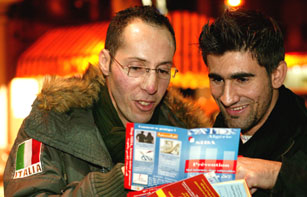
Credit: UNAIDS/P.Virot
Men who have sex with men (MSM) and transgendered people are amongst the most stigmatized populations in the Middle East and North Africa (MENA). In spite of social tension and sensitivities, most countries in the region have recognized the importance of programming for, and working with, MSM to strengthen effective national AIDS responses. Nevertheless, existing prevention programmes have remained limited in scope and scale, highlighting limitations in coverage and quality.
In this context, UNAIDS brought together representatives from civil society, governments, national AIDS programmes and regional and international partners to a workshop in Lebanon to discuss ways to scale up interventions that focus on the needs of MSM in the region.
The workshop was organized in collaboration with Helem-Lebanese Protection for LGBT association, the International AIDS Alliance (AA) and the Regional Arab Network Against AIDS (RANAA). It focused on the outcomes of a policy research project entitled “Enabling Access to HIV Services for Men Who Have Sex with Men - Situational analysis and Partnership Development”. The main purpose of the research, conducted in Algeria, Lebanon, Morocco and Tunisia, was to identify ways to enable and facilitate this access to HIV services.
Most programmes addressing MSM and transgender people in MENA are still at a pilot stage. We need to scale up current programmes using the extensive experience over the last years
Ms Nicole Massoud, Regional Monitoring and Evaluation Advisor for the UNAIDS regional support team in MENA.
Existing repressive laws and policies deter MSM from seeking HIV prevention, treatment, care and support services. Currently 18 of the 21 countries that form the MENA region criminalize male to male sex behaviour—and 4 enforce capital punishment.
Participants at the meeting highlighted the importance of creating enabling environments that allow unrestricted dissemination of prevention messages and services, appropriate provision of HIV treatment, care and support services, and the empowerment of MSM and transgender population in planning, implementing and evaluating programme strategies.
Participants also reviewed a handbook developed by UNAIDS, based on field experiences and lessons learnt, to inform effective, expanded and culturally sensitive programmatic interventions among MSM and transgender people.
“Most programmes in MENA are still at a pilot stage. We need to scale up current programs using the extensive experience over the last years. This handbook, adapted to the region’s context, will hopefully inform interventions among MSM and transgender people,” said Ms Nicole Massoud, Regional Monitoring and Evaluation Advisor for the UNAIDS regional support team.
There are no reliable estimates of the number of men who have sex with men in the region. However, there is documented evidence of increased HIV spread and risk among MSM and transgender people, which may result in concentrated HIV epidemics over the next decade.

Feature Story
UNAIDS Executive Director Michel Sidibé gives guest lecture at Vatican International Study Meeting on HIV
30 May 2011
30 May 2011 30 May 2011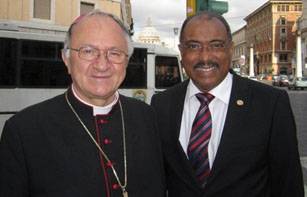
(From left:) Archbishop Zygmunt Zimowski, President of the Pontifical Council for the pastoral care of Health Care Workers; Michel Sidibé, Executive Director of UNAIDS.
Credit: UNAIDS
On 28 May UNAIDS Executive Director Michel Sidibé gave the guest lecture at an international study meeting, “The Centrality of Care for the Person in the Prevention and Treatment of Illnesses Caused by HIV/AIDS”. The meeting was hosted by the Pontifical Council for Health Care Workers and Good Samaritan Foundation in Rome. The event brought together experts on HIV to discuss “people-centred approaches” to the provision of HIV prevention, treatment and care services and economic support to people most in need.
Michel Sidibé engaged the audience in a passionate call for social justice in the HIV response. Highlighting recent ground breaking research on the impact of HIV Treatment for Prevention; he urged the global community to rise to the challenge of funding the global AIDS response because, “funding sustainable health care is a moral obligation, a right not a luxury.”
Funding sustainable health care is a moral obligation, a right not a luxury
Michel Sidibé, UNAIDS Executive Director
Mr Sidibé highlighted the recent results of a study in which early treatment of people living with HIV can be 96% effective in preventing sexual transmission of the HIV virus. “This is a true game changer in the AIDS response,” Mr Sidibé said. “Serodiscordant couples have another extremely effective option for HIV protection. This is very important –something we did not know a few months ago.”
Mr Sidibé described how Treatment for Prevention sits as one element in an important comprehensive set of HIV prevention approaches. UNAIDS believes it is every person's right, including young people, to have access to effective education on human sexuality, health and life skills to enable that person to make informed choices and follow through on them, including abstinence, reducing the number of sexual partners, mutual fidelity and how to use condoms consistently and correctly. Research has shown that such education does not result in increased sexual relations.
He welcomed Pope Benedict’s recent clarification of the use of condoms to prevent HIV who wrote that, “in the case of some individuals,” to use a condom for HIV prevention purposes could represent “a first assumption of responsibility.” Mr Sidibé said this statement was very important: “it has helped me to understand his position better and has opened up a new space for dialogue.”
Archbishop Zygmunt Zimowski, President of the Pontifical Council for the pastoral care of Health Care Workers, highlighted the importance of a holistic approach to HIV prevention, treatment and care in his inaugural address to the meeting.
“Thus the prevention of the sexual transmission of HIV should be approached from the perspective of the total, holistic response against the infection and its roots, no longer and not only limited to the medical-public health aspect, as important as that is.”

Feature Story
G8 Summit: Mrs Carla Bruni-Sarkozy hosts spouse event on the protection of mothers and children against HIV
27 May 2011
27 May 2011 27 May 2011
(From left) Mrs Ban Soon-taek; Mrs Carla Bruni-Sarkozy; Mr Michel Sidibé; Prof Michel Kazatchkine. Deauville, 27 May 2011.
Credit: Laurent Blevennec
Mrs Carla Bruni-Sarkozy brought together the spouses of Heads of State and Government attending the G8-Africa Summit in Deauville to a working lunch dedicated to the protection of mothers and children against HIV.
As Global Ambassador for the Protection of Mothers and Children Against HIV and founder of the Born HIV-Free campaign, Carla Bruni-Sarkozy engaged the spouses to support the goal of ending new HIV infections among children by 2015. The luncheon included Michel Sibidé, Executive Director of UNAIDS who also represented Anthony Lake, Executive Director of UNICEF in his absence, and Michel Kazatchkine, Executive Director of the Global Fund to Fight AIDS, Tuberculosis, and Malaria. The luncheon was an opportunity to take stock of the initiatives already undertaken in the field and to reaffirm the need for all partners to work together to eliminate new HIV infections among children.
We must mobilize political leaders, the media and the public at large to put an end to this inequity so that by 2015 a new generation can be born HIV free
Mrs Carla Bruni-Sarkozy, Global Ambassador for the Protection of Mothers and Children Against HIV and founder of the Born HIV-Free campaign
Speaking at the luncheon, Carla Bruni-Sarkozy stated, “Every year, almost 400,000 children are born with HIV. Over 90% of them live in sub-Saharan Africa. Yet, today, effective treatment to prevent transmission of HIV from mother to child is available and inexpensive. It is unfair and unacceptable that only pregnant women in the richest countries benefit from appropriate medical care and access to treatment. We must mobilize political leaders, the media and the public at large to put an end to this inequity so that by 2015 a new generation can be born HIV free.”
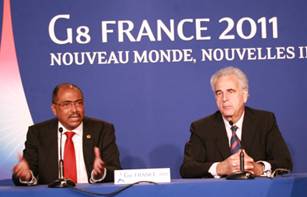
(From left) Michel Sidibé, Executive Director, UNAIDS; Michel Kazatchkine, Executive Director, Global Fund to Fight, AIDS, Tuberculosis and Malaria. Deauville, 27 May 2011.
Credit: UNAIDS
Calling for the need for increased leadership, UNAIDS Executive Director Michel Sidibé said, “As a father I know that every parent’s wish is to do the best for their children. Mothers must be given access to treatment and have the opportunity to ensure their children are born free from HIV.” Echoing this, Professor Michel Kazatchkine, Executive Director of the Global Fund to Fight AIDS, Tuberculosis, and Malaria said, “With G8 leadership and a strong commitment from developing countries, I know we can improve women’s health and by 2015 have an AIDS free generation.”
These efforts will continue when world leaders meet in New York from June 8-10 at the UN General Assembly High Level Meeting on AIDS to chart the future of the global AIDS response.
Earlier in the day Mr Sidibé addressed a press conference to highlight the joint letter that was submitted to the G8 Heads of State. The letter requests the commitment of the G8 leaders to support the goal of eliminating new HIV infections among children by 2015 and keeping their mothers alive. It was signed by Mr Sidibé, Executive Director, UNAIDS; Anthony Lake, Executive Director, UNICEF; and Michel Kazatchkine, Executive Director, Global Fund to Fight, AIDS, Tuberculosis and Malaria.
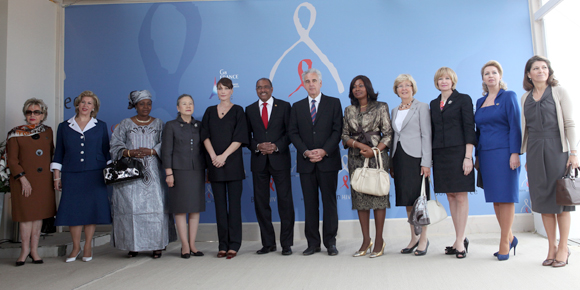
(From left): Mme Viviane Wade, Sénégal; Mme Dominique Ouattara, Côte d’Ivoire; Mme Conde Djenè Kaba, Guinée; Mme Ban Soon-taek, United Nations; Mme Carla Bruni-Sarkozy, France; M. Michel Sidibé, UNAIDS; M. Michel Kazathchkine, Global Fund; Mme Aissata Issoufou, Niger; Mme Geertrui Van Rompuy, European Council; Mme Laureen Harper, Canada; Mme Svetlana Medvedeva, Russian Federation; Mme Margarida Barroso, European Commission.
Credit: Laurent Blevennec
External links
External links
Base documents
Base documents

Feature Story
Reference Group calls on UN Member States to scale-up evidence-based interventions to address HIV among people who use drugs
25 May 2011
25 May 2011 25 May 2011
Credit: UNAIDS
Ahead of the 2011 United Nations High Level Meeting on AIDS, the Reference Group to the United Nations on HIV and Injecting Drug Use has issued a statement calling for Member States to focus on HIV transmission among people who inject drugs. The statement details eight key priorities for Member States as they negotiate the outcome document for June’s General Assembly meeting.
“Harm reduction is neither a matter of rhetoric, nor of politics. It is evidence-based and when implemented to scale, reduces HIV transmission among people who inject drugs,” says Bronwyn Myers, Reference Group Secretariat and Specialist Scientist at the Medical Research Council.
The statement issued by the Reference Group asks governments to commit to scaling-up evidence-based interventions to addressing HIV among people who inject drugs. It details a rights-based public health approach to achieving universal access, such as providing anti-retroviral treatment to people who are living with HIV, and it calls for countries to revise punitive drug and law enforcement policies that can undermine the AIDS response and human rights.
Denying drug users life-saving HIV treatments and drug treatment violates their right to health and harms the community, since it is now known that HIV treatment reduces viral load and can prevent HIV transmission
Dr Steffanie Strathdee, Associate Dean of Global Health, UC San Diego; and member of the Independent Reference Group to the UN on HIV and Injecting Drug Use
“There is still a misconception that people who use drugs can not adhere to HIV treatment regimens, but research shows that they adhere well, especially if HIV treatment is offered in conjunction with drug treatment,” said Steffanie Strathdee, Associate Dean of Global Health at UC San Diego and a member of the Reference Group. “Denying drug users life-saving HIV treatments and drug treatment violates their right to health and harms the community, since it is now known that HIV treatment reduces viral load and can prevent HIV transmission,” Dr Strathdee said.
The Reference Group further underscored the importance of Member States’ ensuring access to the comprehensive package of nine interventions outlined in the WHO, UNODC, UNAIDS technical guide for the prevention and treatment of HIV among people who inject drugs. The need to engage people who inject drugs in the shaping of AIDS responses was also underline. It also highlighted that too many countries have little to no behavioural surveillance on people who inject drugs; even fewer of those who do, have no basic programmes such as needle syringe exchange programmes and opioid substitution therapy.
The statement is a call to the international community to renew its commitment to equitable access to HIV prevention, care and treatment among people who inject drugs and to recognize that injecting drug use is a global phenomenon which affects HIV transmission in both concentrated and generalized epidemic settings.
Reference Group to the UN on HIV and Injecting Drug Use
The Reference Group to the United Nations on HIV and Injecting Drug Use was established in 2002 to advise the UN on the epidemiology of HIV and HIV prevention among people who inject drugs. The Group comprises independent experts and its views and recommendations do not necessarily reflect the positions of the United Nations, the UNAIDS Secretariat or its Cosponsors.
External links
External links
Publications
Publications
- Reference group statement for High level meeting on HIV/AIDS (Independent reference group to the UN, 24 May 2011)
- Reference group consensus statement on interventions for HIV and IDU (Independent reference group to the UN, 24 May 2011)
Related

Feature Story
Business boost for Nepal’s AIDS response
24 May 2011
24 May 2011 24 May 2011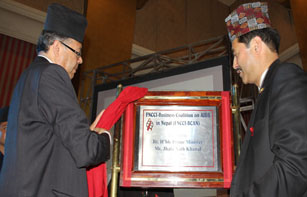
The Right Honorable Prime Minister Jhala Nath Kanal and Mr. Kush Kumar Joshi, Chair of FNCCI, unveil the BCAN logo.
Credit: UNAIDS
Nepal’s AIDS response has received a business boost with the launch of a national Business Coalition on AIDS (BCAN). The Coalition brings together multiple Nepalese private sector companies, leaders, innovators and industrialists to work collectively in the response to AIDS.
The Federation of the Nepalese Chambers of Commerce and Industry (FNCCI) launched the Coalition with the goal of reducing HIV infection among the country’s workforce. It is also expects that the Business Coalition will create a supportive environment for the care and treatment of employees living with and affected by HIV and their families. “This Coalition will work to remove stigma associated with HIV so that people living with HIV do not suffer from discriminatory treatment in the workplace and in society,” said Mr Kush Kumar Joshi, Chair of FNCCI.
In a high-profile event held in Kathmandu in May, Nepalese Prime Minister and Chair of the National AIDS Council, the Right Honorable Mr Jhala Nath welcomed the business sector as vital partners: “The Government of Nepal acknowledges with utmost appreciation this initiative from the business sector to be engaged and contribute to the country’s response on HIV. This is an important part of the business sectors’ response towards the social development of Nepal”.
Pioneered by business leader Mr Rajendra Khetan who also leads the Asia Pacific Leadership Forum on AIDS (APLF), and who for many years has worked to bring AIDS higher on political, business and social agendas, the FNCCI-BCAN already has more than 1 500 members from across the country. These private sector leaders have underlined their commitment to put in place HIV prevention, treatment and care programmes to help maintain a healthy and competitive environment for their workers and their families, including those from key affected communities.
The Government of Nepal acknowledges with utmost appreciation this initiative from the business sector to be engaged and contribute to the country’s response on HIV
Jhala Nath, Prime Minister of Nepal and Chair of the National AIDS Council
In Nepal, estimated adult HIV prevalence is 0.4% but the country also has a ‘concentrated’ epidemic where estimated HIV prevalence among key affected populations reaches more than 5%. According to latest national reports, more than 85% of the newly reported HIV cases are among people aged 16-45, which is the most economically active age group.
“The most immediate way that business and the new business Coalition can take action is by protecting its greatest resource—its employees. In doing so, the Coalition is investing in the well being and morale of employees and communities, and investing in the sustained growth and development of Nepal,” said UNAIDS Country Coordinator Marlyn Borromeo.
As a first priority, businesses within BCAN commit to ensure the implementation of the National Policy on HIV/AIDS in the Workplace which highlights the need for increased resources and action from the private sector on AIDS and the importance of protecting employees living with HIV and their families.
Ms Sita Shashi, President of Srijanshil Mahila Samuha, an organization of women living with HIV in Nepal, heralded the increased involvement of the business community in Nepal’s HIV response: “[This] has enhanced our confidence that business can bring positive change; ensuring access to HIV prevention, treatment, care and support in workplace; supporting economic empowerment opportunities for women living with HIV in communities and; promoting accepting attitude towards people living with HIV and their families,” she said.

Press Release
‘Life Ball’ commemorates 30 years of AIDS
23 May 2011 23 May 2011Charity event spotlights HIV epidemics in Eastern Europe and Central Asia
VIENNA, 23 May 2011—Celebrities and influential leaders in the global AIDS response gathered at Vienna’s City Hall on 21 May for the 2011 Life Ball, Europe’s largest annual AIDS charity event. This year’s Life Ball commemorated 30 years of AIDS and focused on the rapidly growing HIV epidemics in Eastern Europe and Central Asia.
“The Life Ball is not only about celebrating life, but also about creating a social movement to stop stigma and discrimination,” said Michel Sidibé, Executive Director of UNAIDS, speaking at a press conference on 21 May. “Gery (Keszler) and AIDS LIFE are a voice and force of change in this movement,” he added.
Mr Sidibé was joined at the press conference by Gery Keszler, co-founder and Chairman of AIDS LIFE, a non-profit organization that organizes the Life Ball. Other speakers included singer Janet Jackson representing amfAR, clothing designers Dean and Dan Caten of Dsquared2, and Hollywood actress Brooke Shields.
Before the opening ceremony of Life Ball, a number of eminent guests attended the AIDS Solidarity Gala, a fundraising dinner co-hosted by UNAIDS and AIDS LIFE under the patronage of the President of the Republic of Austria, Heinz Fischer. Proceeds from the event will be used, in part, to support UNAIDS programmes in the Russian Federation and Ukraine.
Over the past decade, the number of people living with HIV in Eastern Europe and Central Asia nearly tripled—from an estimated 530 000 in 2000 to 1.4 million in 2009. The Russian Federation and Ukraine together account for nearly 90% of newly reported HIV infections in the region. Though the epidemics in Eastern Europe and Central Asia are mainly concentrated among people who inject drugs, sex workers and men who have sex with men, these populations have limited access to HIV services.
At the Life Ball opening ceremony, 30 international personalities presented milestones in the epidemic’s 30-year history. The UNAIDS Executive Director highlighted the founding of UNAIDS in 1996 and the “glimmer of hope” that same year when combination antiretroviral therapy proved effective in keeping people living with HIV alive.
Former United States President Bill Clinton noted in his remarks that substantial price reductions in antiretroviral medicines since the year 2002 had greatly expanded access to treatment for millions of people. However, he said, a major treatment gap remains: “Ten million people in poor countries still need to be on (antiretroviral) medicines. If you want to cut the infection rate, if you want to cut the death rate, we have to finish the job.”
Every year, the Life Ball recognizes the work and dedication of pioneers in the AIDS response through the “Crystal of Hope” award. This year’s award of 100 000 EUR was presented to Anya Sarang, President of the Andrey Rylkov Foundation for Health and Social Justice, a non-governmental organization based in the Russian Federation that advocates for the human rights of people who use drugs.

Feature Story
New manual and workbook for costing HIV facilities and services in countries aims to standardize data collection to improve planning
23 May 2011
23 May 2011 23 May 2011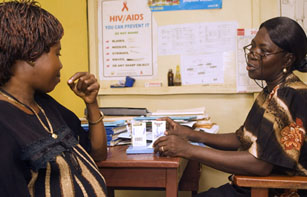
Credit: UNAIDS/L.Taylor
In the context of decreasing international funding for HIV responses, policymakers in many middle- and low- income countries are trying to contain the increasing costs for service delivery, commodities, drugs and other costs, while at the same time scaling up HIV prevention, treatment and care services.
In order to help countries monitor and evaluate the economic aspects of HIV service provision, UNAIDS has produced a generic HIV facility costing document titled Manual for Costing HIV Facilities and Services.
The manual, together with an accompanying Workbook for collection of Cost Information of HIV Services, have been produced to provide standardized guidance for countries to collect cost data in their facilities that provide HIV prevention or treatment services.
A major problem in middle- and low-income countries continues to be a lack of basic information on the use of services, their cost, outcome and impact; those few costing studies which are performed are often not implemented in a standardized fashion
Eddy Beck, UNAIDS Senior Technical Advisor
“A major problem in middle- and low-income countries continues to be a lack of basic information on the use of services, their cost, outcome and impact; those few costing studies which are performed are often not done so in a standardized fashion,” said Eddy Beck, UNAIDS Senior Technical Advisor.
The new publications aim to provide policymakers and implementers with the tools to provide robust and contemporary strategic data, which can inform their national strategic plans. This includes financial information on expenditure and costs to help the planning, implementation, monitoring and evaluation of HIV services that are sustainable in the long term.
Efficiencies can pre-empt increasing costs such as the future number of people requiring second- or third-line drugs thanks to the success in closing the gap in treatment access. These guidelines are therefore designed to help countries achieve such much-needed efficiency gains that will allow them to efficiently scale up and deliver all HIV services required.
Contacts
Contacts
- Eddy Beck
- UNAIDS Senior Technical Advisor
- tel. +41 22 791 5521
- becke@unaids.org
- Carlos Avila
- Team Leader, Strategic Intelligence and Analysis
- tel. +41 22 791 5094
- avilac@unaids.org











